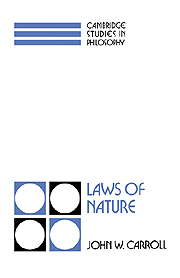Chapter 1 - Centrality
Published online by Cambridge University Press: 12 January 2010
Summary
The goal of this book is to provide a better understanding of the concept of a law of nature, to show what lawhood is like, to say how it relates to the rest of our conceptual equipment. Other attempts have been impeded by two factors that in combination present a formidable obstacle. The first is an ensconced way of going about things; in essence, one that sees worthwhile understanding of lawhood as dispensed only by a suitably antiseptic description of the essential differences between laws and nonlaws. The second is a curious feature of laws: Laws have a modal character in that not every true proposition, not even every true universal generalization, is a law. For example, suppose that I bought a brand new pair of pants earlier today. After putting on the pants, I placed two nickels in my pocket. Because those pants will be destroyed in a fire tonight, those are the only coins that will ever be in that pocket. Then, there is the true universal generalization that all the coins in my pocket are nickels. Though perfectly true, this proposition is not a law. It fails to be a law because its truth is an “accident”; it is accidentally true. In contrast, consider Newton's first law of motion, the generalization that if no force acts on a body, its acceleration is zero. Assuming for the moment that it really is a law, this Newtonian generalization is not accidentally true.
- Type
- Chapter
- Information
- Laws of Nature , pp. 1 - 27Publisher: Cambridge University PressPrint publication year: 1994



